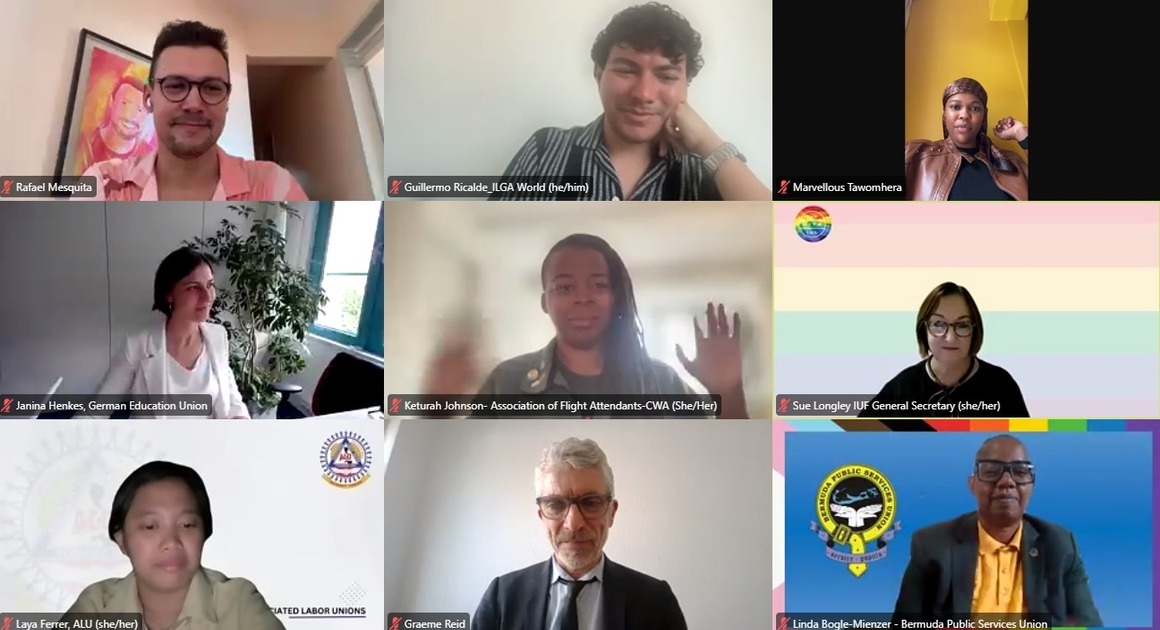1 July, 2024A webinar hosted by the Council of Global Unions LGBTI Coordinating Committee, which was attended by 175 people on 26 June, brought together speakers from the United Nations, trade unions and civil rights groups. The event, "Forward despite the backlash: LGBTI rights and the freedom of association," delved into the complexities of advocating for LGBTI rights in the face of increasing global restrictions on freedom of association and expression, and the current anti-LGBTI backlash.
Professor Graeme Reid, UN independent expert on sexual orientation and gender identity (SOGI), presented his new report which shows alarming trends of state-enforced laws across the world that not only suppress LGBTI expressions but also instigate violence and discrimination.
"States in all regions have intensified efforts to enforce restrictive laws, leading to a chilling climate of fear and self-censorship among LGBTI individuals."
Professor Reid highlighted the dual harm these laws cause by violating human rights and fostering a hostile environment that often precedes violence.
Clément Nyaletsossi Voule, UN special rapporteur on the rights to freedom of peaceful assembly and of association underscored that these freedoms are the bedrock of democracy, highlighting the detrimental effects of marginalisation and the alarming trend of using LGBTI issues as pretexts for restricting the rights of minority groups.
"You cannot build peaceful societies if all its members, including minorities, are not allowed to benefit from these rights,"
Volue concluded.
Powerful testimonies from LGBTI trade unionist and civil society leaders provided regional insights and shared personal experiences that underscored the global urgency of the issue.
From Bermuda, Linda Bogle-Mienzer from Public Services International (PSI) expressed the fear and legal challenges faced by the LGBTI community.
"We live in a society organising to roll back basic human rights,"
she stated, calling for a unified trade union response.
Laya B. Ferrer, education and information officer at the Associated Labor Unions (ALU-TUCP) in the Philippines, an IndustriALL Global Union affiliate, addressed workplace discrimination, noting that
"LGBTI workers often face verbal and physical harassment which affects their mental health and job performance."
Ferrer’s comments highlighted the lack of comprehensive national laws protecting LGBTI workers, highlighting the critical role of trade unions in advocating for such protections.
Janina Henkes, senior policy advisor for women, equality and gender at the German Education Union (GEW), an Education International (EI) affiliate, discussed the legislative progress and backlash in Germany.
"The Self Determination Act for gender identity, coming into effect this November, marks a significant step towards inclusivity, yet we face heavy opposition from far-right movements."
Keturah Johnson, International Vice President of the Association of Flight Attendants-CWA (AFA-CWA) in the USA, affiliated to the International Transports Federation (ITF), shared sector-specific challenges and the union’s efforts to combat discrimination.
"Our union has long fought against discrimination based on gender identity and expression, and we continue to push for respect and safe work environments for all our members,"
Johnson remarked, pointing out the importance of respect, inclusivity, and safe working environments.
Brazil’s Rafael Mesquita, President of the Ceará Journalists' Union (Sindjorce) and director of the National Federation of Journalists (FENAJ), affiliated to the International Federation of Journalists (IFJ), discussed the role of journalism and the media in advancing LGBTI rights.
"In Brazil, despite legislative stagnation, we have made strides in integrating LGBTI protections into collective agreements."
Marvellous Tawomhera National Young Workers Chairperson for the IUF affiliate, the Zimbabwe Catering and Hotel Workers Union (CHWU), highlighted the contrast between legal progress and societal resistance in Africa.
"While some countries like South Africa have embraced equality, others continue to impose severe penalties on the LGBTI community."
Guillermo Ricalde from ILGA World, discussed the significant role trade unions play in advocating for LGBTI rights, noting their historical and ongoing contributions to enhancing visibility and protection for LGBTI workers.
"Our collaboration with trade unions has been instrumental in advancing LGBTI rights, despite facing substantial barriers from legal restrictions and employer practices that hinder union activities,"
Ricaldo highlighted. He stressed the importance of legal recognition and registration for LGBTI organisations to operate effectively and represent their members.
Sue Longley, IUF general secretary and the moderator of the event, emphasised the collective challenge and responsibility to combat discrimination not just within the labour movement but across societies.
"Today’s discussions reinforce our commitment to defending freedom of association for all communities."
The webinar highlighted the interconnectedness of various forms of rights, as well as painting a picture of a concerted global effort to uphold and advance the rights of the LGBTI community amidst rising authoritarian and conservative tides. The discussions made it clear that the fight for LGBTI rights is linked to broader human rights agendas, including the fight against authoritarianism, the protection of freedom of association and expression, and the battle for gender equality.


